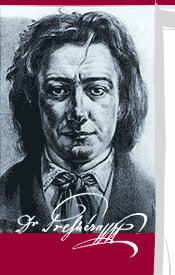| |
|
|
| 1836 |
A year of doubt and searching, the
appearance of Ana Jelovšek |
|
| |
|
|
 |
fter a few years of intensive creativity,
there appears a pause in Prešeren's work. From some poems,
for example, the ballad Ribič
(The Fisherman), we can sense that the poet has given
up his hope that his love for Julija
will ever be fulfilled. In his creative life, he became
interested in Slovene folk songs and the oral tradition,
whilst in his love life, Ana
Jelovšek, the young nanny at the Crobath's, appears
on the scene.
|
|
| |
The Polish aristocrat and intellectual,
Emil Korytko, had been exiled by the Austrian authorities
to Ljubljana because of his revolutionary ideas. Prešeren
met the young Pole whilst visiting the home of his employer,
Dr Crobath, where the exile first lived. The two men were
kindred spirits and became genuine friends. Prešeren,
who was still keenly missing Čop's extensive knowledge
and intellectual depth, finally found in Korytko someone
he could talk to. They taught each other their mother
tongues; Prešeren translated, with Korytko's help, the
sonnet Resygnacja, written by the famous Polish poet Mickiewicz.
The young Pole was full of vitality and plans he could
not realise because of his exile. When Prešeren introduced
him to the rich Slovene folk tradition, Korytko found
a new goal. He started writing down folk songs, travelled
around the countryside, collecting various folk literature,
and Prešeren helped him. Unfortunately this enthusiastic
joint project was soon halted by death; when the collection
of folk songs was ready to be printed, Korytko became
ill and died soon after. Ironically, at the time of his
death, a decree reached Ljubljana, allowing him to return
to Poland. Prešeren came face to face with death on a
number of occasions around that time; his father died,
as did his uncle Jakob, as well as the priest who was
temporarily in charge of the hilltop church of Šmarna
gora, where the poet regularly went on outings with his
Ljubljana friends. In the autumn of 1839, Andrej
Smole, the poet's friend and contemporary from his
youth, returned to his old friends after many years of
living and travelling abroad. Smole spent his last years
at Prežek Castle in Dolenjsko, where Prešeren visited
him on a number of occasions. Smole was physically weak
on his return to Ljubljana, but his spirit was still fresh;
he persuaded Prešeren to take part in the setting up of
a Slovene newspaper and in publishing works of literature.
Together they published Vodnik's poems and Linhart's Matiček,
but the newspaper did not appear. The censor's office
did not allow it, which led the rebellious Smole to demand
an audience with the Emperor in Vienna. But before he
managed to set foot in court, he had a stroke during the
celebration of his name-day. As if Prešeren had not had
enough grief already, Smole died literally in his arms.
|
|
| |
|
|
| |
|
|
   |
|
|
|
|


